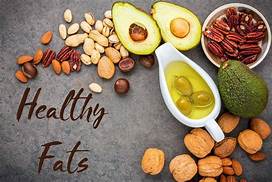
1. Butter
It is a very common fat that everybody has (or should have from now on) in their fridge. As opposed to industrial trans fat, which increases the the risk of heart disease, the trans-rumenic acid called conjugated linoleic acid (CLA) is thought to decrease the risk for cardiovescular disease. CLA along with other natural trans fats as well as vitamin K2 are abundantly found in grass-fed meat and dairy products, which is why butter is a great source to maintain cardiovescular health and to prevent heart attacks.
2. Coconut Oil
Coconut oil currently has gained in popularity for all kinds of health remedies and benefits. The hype is justified and it definitely belongs in the kitchen and on this list! First of all, coconut oil is one of the best oils to cook with as it is with more than 90% almost entirely saturated. Its chemical structure stands out to other fats and oils in our diet, which has a significant effect on the body and the heart. Coconut oil is composed of a special type of saturated fat called medium chain triglyceride (MCT). This structure makes the oil special because the vast majority of fats and oils we consume are composed of long-chain fatty acids (LCFA). In fact, both the saturated and unsaturated fat found in meat, eggs, milk, and plants consist of LCFA.
That means that most of the western world gets way too much of these fats and not enough of the MCFA’s that are found in coconut oil.
Why does that matter? Because of its shorter chemical composition, MCFA’s are absorbed with ease without requiring pancreatic enzymes to break them down. This means less work for the pancreas and the fatty acids can go directly to the liver from where they go into the mitochondrias and are immediately utilized for energy. The best part is that coconut oil makes our heart happy by protecting it from heart disease as well as lowering the risk of atherosclerosis.
3. Duck Fat
Just like butter, duck fat is packed with the favorable CLA’s and natural trans fat that were found, in animal studies, to prevent fatty streaks and plaque formation in the arteries of rodents by changing macrophage lipid metabolism.
Another statistic, however, shows that the same effect seems to apply for humans as well. According to the World Health Organization’s Multinational Monitoring of Trends and Determinants, in the United States, of every 100,000 middle-aged men, 315 die of heart attacks each year. However, in the Gascony region, where duck liver is a steady part of the diet, this rate is only 80 per 100,000. A great statistic for the consumption of duck fat and the relation to a healthier heart!
4. Leaf Lard
This fat is a highly popular fat in the kitchen of every celebrity cook. For good reason! Lard is a very stable fat which makes it an excellent choice for frying. Morover, it has a higher smoking point than other fats therefore it is excellent for cooking in general. It is gained from the visceral fat deposit that surrounds the kidney and loin and because of its little pork flavor, leaf lard is considered the highest grade of lard.
Nutritionally speaking, lard is composed of more than twice the monosaturated fat and nearly one-fourth the saturated fat than butter. In addition to that, it is also low in omega-6 fatty acids, known to promote inflammation, which is good news for a healthy heart.
5. Ghee
Ghee, a great fat for cooking, taste, and cardiovescular health. It is made from butter, however, the milk solids and impurities are removed, which makes it consumer friendly for everybody, including people who are lactose or casein intolerant.
Just like coconut oil, it is composed of medium chain fatty acids (MCFA), which are directly absorbed to the liver and burned as energy. Besides of being a fabulous energy source, it contributes to a healthy heart as it protects the arteries from hardening. A study from 2010 found that people in India, where ghee is originated from and thus has the highest population of consumers, had fewer cases of heart disease than our western world.








